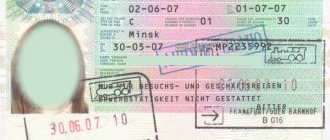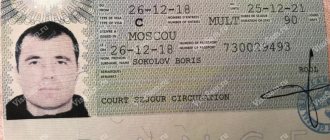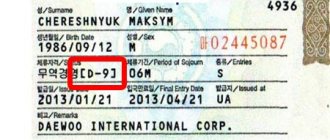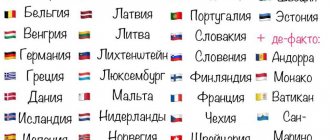Schengen visa refers to permitting documents. A person receiving a visa has the right to enter and leave a foreign country, to stay on its territory for a certain period of time, including as part of a transit flight.
The Schengen visa deserves special attention - it is valid on the territory of a large number of European countries that have signed the agreement of the same name. If a Russian citizen wants to visit Europe, he will have to obtain a tourist permit.
Answers to the main questions about the Schengen visa
If you have never been to Europe or have never crossed the borders of other countries, you should know the following:
- The rule of first entry into Schengen does not apply - it simply does not exist. Read more in our article “Rule of first entry into Schengen 2021“, but for now let’s clarify briefly: if you plan to travel to several European countries, then obtain a visa at the consulate of the state of your main destination. Determine it by the number of days of stay or the purpose of the trip. The country of entry does not matter. For example, if you have a tour of France (3 days), Spain (7 days) and Portugal (4 days), then you need to contact the Spanish consuls. This is because you will spend the most time in Spain (e.g. Madrid). If you want to stay in two countries for the same period of time, choose either one. For example, when visiting Belgium and Germany for 8 days (4 days each), you can contact either the Belgians or the Germans. It is better to cooperate with the consulate where it is easier and faster to obtain the document you need.
- Contrary to popular belief, border guards, not customs officers, are responsible for checking documents. Although there are exceptions to the rule: in some countries, it is customs officers who can request both a passport and a visa. We are talking about Slovaks, Swedes, Norwegians and Finns. This is also practiced in Hamburg, Bavaria and Bremen. In most cases, customs officials check exported and imported goods and look for unauthorized weapons and drugs. A lot of cash can attract the attention of employees. As for passports, they are checked exclusively by border guards and no one else.
- The Schengen Agreement covers 26 countries. Data is current as of January 2021. When answering the question of why a Schengen visa is needed, pay attention to the scale of opportunities that you get when you apply for the document: a person receives the right to freely move around more than two dozen countries. The easiest way to apply for a Schengen visa is to six countries, a list of which can be found in our article.
Although initially there were only 7 countries among the Schengen states. They signed an agreement that came into force in 1995. The first were the French, Spanish, Germans, Belgians, Portuguese, Dutch and Luxembourgers. A couple of years later the Italians and Austrians joined them. In 2000, Greece joined the Schengen countries. A year later, the list increased by another 5 states. Later, part of the Baltic states and a number of other states were included in the list. The result was 26 members.
It is worth paying special attention to the countries shown on the map of Europe: Ireland, Croatia, Cyprus, Bulgaria, Macedonia, Great Britain and Romania - they are not part of Schengen. Again, this information is current as of January 2021.
Extension of a tourist visa to Russia
Usually, a tourist cannot extend his stay. How to extend a tourist visa to Russia? In a number of exceptional cases this is still possible.
An extension is allowed if the foreign guest:
- needs emergency treatment;
- caring for a seriously ill relative;
- forced to stay to resolve issues related to the death of a relative.
For an extension, you must contact the migration service. To extend a tourist visa in Russia, a foreigner will have to:
- Fill out an application.
- Collect a number of papers. The package of submitted documentation must include a document justifying the extension of stay.
- Pay the state fee. Citizens of certain states (in particular, EU countries) are exempt from paying state duty.
What Schengen visas are there?
There are 6 categories of visa documents:
- A. A person receives the right to stay in the transit zone, which is located on the territory of a Schengen country. Typically, this type of visa is issued to citizens of Iraq and some CIS countries. Russian residents need such a document in exceptional cases, for example, when flying from Georgia or Turkey. Some routes pass through French airports.
- Q. Currently there is no such visa. Previously, it provided the right to regular transit for no more than 5 days. In addition to the possibilities mentioned in the first option, a person freely left the airport to the arriving city, and then boarded the flight again and continued the trip to the destination. If you want to get these rights now, you will have to apply for a regular visa.
- Schengen visa type C. The most common document. People apply for it for tourist, guest, business and transit trips. Citizens with this type of visa do not receive the right to work.
- D. Long-term national visa (more than 90 days in Schengen territory within six months). Since April 2010, the document’s capabilities have been reduced and are equal to option C (in particular, the total period of stay is 6 months).
- LTV (in Spain – VTL). A person receives the right to stay, transit or enter only certain Schengen countries. This visa is rarely issued, in exceptional cases.
- FTD or FRTD . A transit document issued in a simplified manner. Its action is strictly limited. A person receives the right to transit along the route Kaliningrad region - another part of Russia and back. Transit traffic by land through Lithuania. If we are talking about railway transport, a citizen of the Russian Federation does not have the right to leave the railway station.
Thus:
In 99% of cases, when applying for a Schengen visa, you will receive a type C document.
Documents for a visa to Greece: nuances
The main difficulty for travelers is the registration process, which requires collecting a large package of papers. When collecting documents for a visa to Greece, you should take into account your goals, status, age and other parameters.
Employed citizens
For working travelers, the following document requirements are put forward:
- Questionnaire.
- Application form with signature in four places. Without its execution, the rest of the package will not be accepted for consideration.
- International passport and a copy of the 1st page of all permits to the Schengen area. The validity period is not the moment of application from 90 days.
- Color photo 3.5x4.5. We will consider the requirements in detail below.
- “Internal” document of a citizen of the Russian Federation (copies of pages with photos and registration).
- Temporary registration document (copy). Must be valid for three or more months at the time of application to the Consulate or CC.
- Confirmation of employment (certificate). The document indicates the address, telephone number, position, salary (from 12,000 rubles). Must be signed by the head of the company.
- Insurance policy. Must cover the entire duration of the trip. Amount from 30,000 €.
- For individual entrepreneurs - TIN or OGRN certificate (copy).
- Hotel reservation and copy of round trip travel documents.
- Receipt for payment in full of the fee.
Having such documents in hand, obtaining a visa to Greece should go smoothly and without delays.
Entrepreneurs without forming a legal entity
In addition to the above package of papers, the individual entrepreneur must prepare:
- certificate of state registration of individual entrepreneurs;
- documentation on registration with the Federal Tax Service;
- certificate of income from the Federal Tax Service (an alternative is a copy of the declaration);
- print from work (if provided).
Non-working persons
If a person does not have official employment or belongs to the category of pensioners, he may be required to provide an additional package of papers. It includes:
- certificate of movement of funds in a bank account (amount from 45,000 rubles) with a validity period of a month or more;
- a letter from the sponsor, drawn up in an alternative form, supported by a certificate from the employer of the sponsoring person (an alternative to the above certificate);
- a copy of the student card (for university students);
- a copy of the pension document (for pensioners) or a certificate from the Pension Fund.
If there is an application from a sponsor, the latter must have a salary of 20,000 rubles or more, and expenses per person of 57 € or more.
Minors
When applying for a visa to Greece in 2021, traveling with minors, it is important to prepare additional papers and take into account a number of requirements. To travel abroad you will need:
- photo pasted into the parent’s passport (if the child is under 14 years old);
- international passport if the minor is over 14 years old.
The visa period for the child is requested taking into account the shorter validity period of the parental permit. The likelihood of successful registration increases if consent for a person under 18 to visit Greece is issued for a period of more than three years.
The set of documents for obtaining a visa to Greece differs depending on the identity and number of persons accompanying the child (additional papers):
- both parents - without additional documents;
- one parent - consent to travel (copy) and a copy of the passport (1st page of the accompanying person);
- without parents - consent to travel, issued by both parents, indicating the details of a third party (under 12 years of age, accompaniment is required);
- with the guardian - consent from the administration or social security authority (copies), confirmation of the right of guardianship/trusteeship (copies).
If a parent is transporting a child alone and has sole rights, he must confirm this fact. Here, a copy of the death certificate of the mother/father, a paper from the registry office about the entry from the mother’s words, a decision of the judicial authority on deprivation of rights or recognition as missing can be used.
Foreign citizens
The above conditions are relevant for Russians to obtain a visa to Greece. Foreigners are subject to more stringent requirements. They need to prepare (in addition to photos, questionnaires and other documentation):
- passport of your country;
- international passport;
- residence permit in the Russian Federation or residence permit;
- a certificate from the place of employment (must include information on salary, position) with the stamp and signature of the director;
- document from the bank with account information.
If you have a job, the salary should be from 30,000 rubles. When checking the account, it is taken into account that the movement of funds over the last 90 days is from 40,000 rubles.
When traveling by car
To obtain a visa when traveling by car you will need:
- driver's license;
- Green card;
- PTS;
- round trip route.
In the latter case, it is necessary to describe in detail the travel plan in both directions, including within the territory of Greece, in order to increase the chances of obtaining a visa.
By invitation
If a person plans to obtain a visa to Greece for a visit, an invitation from an EU or Greek citizen must be attached to the basic package. The document must be officially certified. The invitation is valid for up to three months. You also need information about the person who is inviting you to the country - full name, registration, telephone number, details of relatives, a copy of the passport and information from the insurance company. The presence of the applicant is required when handing over the papers.
For business purposes
If a person goes to Greece for business purposes, an invitation from a local company or legal entity indicating the data from the passport is additionally required. You also need to specify the purpose of the trip and the duration of your stay in Greece. You need a certificate from your place of work (must have a stamp). Sometimes the Consulate may request other documents.
What other countries can you visit if you have received a Schengen visa?
It’s strange, but lucky holders of a Schengen visa can visit not only the twenty-six Schengen countries, but also several others. Here's where else you can go with this visa:
- Albania. You need a visa category C (multiple entry) or D. You can replace it with a residence permit.
- Bulgaria. The conditions are the same as when visiting Albanians. The 90 day rule also applies. You can stay in the country for six months, but not more than this period. Every 6 months the count starts from zero.
- Gibraltar. A C visa is required, which allows multiple entries. You cannot stay in Gibraltar for more than 21 days. If the visa document expires before 21 days have expired, the period of stay is calculated using the formula: 1 week is subtracted from the remaining days of the visa validity.
- Cyprus. Category C. If double or multiple trips are allowed, you must first enter the Schengen territory and then Cyprus. If you have a one-time right to visit the country, enter the island from Schengen states. There are no separate time limits, as there are when traveling to Gibraltar.
- Costa Rica. Here, on the contrary, there are no requirements for the type of visa document. But the period must be less than 3 months, starting from arrival in Costa Rica.
- Panama. You must have a visa from a country that is a member of the EU. Visiting the state is permitted with a double or multiple entry visa. First you must visit the country whose consulate issued the document.
- Reunion . Look at the visa sticker. If it says “also valid for Reunion”, you can visit the French region.
- Romania . You can come to the country with a visa (category C) with double/multiple entry to Schengen or a residence permit. You can stay in Romania for as long as indicated in the permit document. The general rule of 6 months applies.
- French Guiana . This overseas region is open to tourists as long as they have the entry “also valid for French Guiana” on their visa sticker.
- Croatia . To be in the republic, you need to get a visa C, D. A residence permit is also suitable. To determine how long you can stay in the country, refer to the time limits in the Schengen document. But every 180 days you are allowed to stay in the countries of the agreement for no more than 90 days.
The figure shows countries that can only be visited with a Schengen visa. They are highlighted in blue. There are quite a lot of them. The consulates of these states are engaged in issuing permits. Citizens of the Russian Federation can visit some visa countries if they have a Schengen visa. But this issue requires more careful consideration.
Green color corresponds to countries where people with Russian citizenship can travel freely. In some countries, it is enough to present an internal passport, for example, when traveling to Belarus. In others, you will be required to provide a foreign passport.
The rest of the territory that does not fit into the above groups is highlighted in grey.
Please also pay attention to such concepts as the EU, euro area, Schengen. These are different concepts that have significant differences. If a country is a member of the European Union, it is not necessarily included in the list of Schengen states and vice versa. Combinations can be very different.
And one more thing: Switzerland, Iceland, Liechtenstein, Norway are not part of the customs union. If you cross the border with them, moving from Germany for example, be prepared for customs control. You will be asked to declare and, if necessary, present the cargo being transported. It is interesting that the above countries are part of the Schengen zone, you can enter there with a visa of the same name - there is simply additional control.
How to apply for a visa to Greece yourself
In the section “How much does a visa to Greece cost for Russians” we looked at the costs of obtaining a permit for citizens of the Russian Federation. It is clear from the section that the most profitable option for travelers is self-registration through the Consulate. In this case, you must make an appointment in advance, collect and bring a package of papers at the agreed time, and after a certain time, appear for the documents.
The downside is that Consulates, as a rule, deal with the issuance of type D (national) permits. Issues with type C are resolved in the situation where the Visa Center refuses to provide the service. In addition, when requesting a visa to Greece through the Consulate, you must contact the authority that deals with a particular region.
Visa Center
Citizens of Russia must contact the CC that oversees the issuance of permits for a specific region. Offices of such services are available in many cities of the Russian Federation, including Krasnodar, Vladivostok, Kazan, Yekaterinburg, Khabarovsk, St. Petersburg, Moscow, etc. Regardless of the region of residence, independent visa processing for Russians proceeds according to the following algorithm:
- Determining the type of permit required and collecting papers.
- Registration for submitting documentation at the nearest CC.
- Visit the authority at the specified time to submit fingerprints.
- Payment of the cost of a visa to Greece (service and consular fees).
- Transfer of collected documentation and wait for a decision.
Information can be controlled on the official VC resource. This feature is free and available to all users. It also indicates the time when you need to appear to receive documents.
Applying for a visa to Greece online
Today there is an option to obtain a permit to travel to Greece online. For this:
- Log in to the website that provides the service.
- Apply for a permit.
- Wait for a call from managers who will clarify the specifics of the trip.
- Submit the required package of documentation (by courier, in person, by e-mail) and pay for the service.
- Visit the consulate or CC as usual to submit your fingerprints (if this has not been done in the last five years).
- Pick up your visa within a week yourself or by courier.
The online registration process is suitable for those travelers who do not have time to visit the necessary institutions. But it is worth considering that in some cases you will still have to come to the Consulate in person (for example, to undergo fingerprinting).
Travel agency
When traveling to Greece, a visa is required for Russians who are traveling to the country for tourism purposes. Such work is often entrusted to a travel agency. In this case, the client does not need to do anything - just transfer the documentation package. The form is filled out by a company employee, and he also gives the papers to the CC. The downside is that a permit issued through a travel agency will be more expensive than obtaining it yourself. If you have not previously received a visa, you will still have to go to the Consulate to undergo fingerprinting.
What rules apply to a Schengen visa?
- Are there any other territories that are not a Schengen area or have a special status? These countries include Andorra (formally, a visa is not required, but you can only get here through France or Spain, which means you can’t do without a double or multiple visa); Vatican (the status of the state is unclear; checks are not carried out at the borders); Liechtenstein (since the end of 2011, part of Schengen, entry rules are the same as in Switzerland); Monaco (when crossing the French border, a joint agreement between these two states applies); San Marino (to enter here, follow the rules for visiting Italy).
- Is a Schengen visa valid when visiting the UK? The document is not valid because the British Kingdom pursues an independent policy on immigration issues. The rule also applies in the opposite direction. If you have received permission to enter Ireland, it is not valid in the Schengen countries.
- Is it possible to get to Bulgaria and Romania with a Schengen visa? It is forbidden. On the territory of these states, different rules apply.
- What is the maximum validity period for a Schengen visa? According to current regulations, it is 5 years. You get the right to stay abroad for 90 days every 6 months. Multiple trips are allowed.
- Is a single package of documents approved when applying to the consulate? There are various rumors, but officially there is no such list. Each consulate establishes its own procedures and requirements. Even representatives of the same state in different cities may adhere to different rules. There are also differences when applying to a visa center or consulate. When applying for a visa, you will be required to provide a passport, photographs, health insurance and an application form. Each document has a specific format.
- How are Schengen countries different? Requirements for candidates for obtaining a visa, the procedure for processing documents for entry into the country, their validity period, duration of stay on the territory of the state, rules on the issue of airport transport visas.
Standard deadlines for some countries
The time it takes to obtain a Schengen visa may vary depending on the country. In practice, obtaining a visa to Spain, Greece and Poland is often faster than to other European countries. The Spanish consulate can process documents in 4 days. An entry permit to Italy can be obtained in 5 days. Representative offices of the Baltic countries promise to complete the paperwork within 5 days. The French embassy can issue a visa in 4-10 days. Czech missions issue permits in 5-20 days.
These deadlines take into account only working days and imply the submission of a complete package of documents and the absence of errors. If the submission of the application falls on a general weekend or official holiday of the state to which the consulate belongs, the time frame for issuing the permit increases, because employees may not work.
How to get a Schengen visa?
Obtaining a Schengen visa involves collecting documents. If you are planning a tourist visit, check the website of the desired consulate to find out exactly what you will need. Requirements at Consulates of different countries may vary. But they will definitely require your valid foreign passport. He must “work” for another 3 months after the visa expires (although in urgent situations, if there are sufficient grounds, this point is not taken into account). To enter information about visiting foreign countries into your passport, you will need 2 blank pages (they do not have to be facing pages). And one more thing that doesn’t apply much to Russians, but concerns others, is that they have received a passport within the last 10 years. In the Russian Federation this is the maximum period, so the requirement is always observed.
In addition to the international passport, the candidate for a visa fills out an application form. In some cases this can be done online. The consulate requests photographs that must meet the requirements for them. It is mandatory to have health insurance. Its validity period must cover the period of travel, and the validity area must cover all Schengen states. Minimum insurance coverage is 30 thousand euros. It is better to check with the consulate in advance what the insurance policy should be.
Well, then there were differences: where to submit the collected documents and passport?
Let's remember once and for all: A multiple-entry Schengen visa, like other types of this document, is not bought, taken, opened, placed, opened, or activated - citizens receive it at the consulate or embassy: independently, with the help of official intermediaries or thanks to commercial companies.
- If you contact such a company, then its representatives will do your work for you, that is, they will draw up ALL documents for you and submit them to the Consulate. They do not deal with visa processing, but only help in filling out the application form and collecting papers. Perhaps they will tell you about the presence of some special channels, established relationships or connections. Know: all this is a fiction of companies, and nothing more than a marketing ploy. If there are corrupt employees at the Consulates, they will demand at least 1000 euros from you.
- There are also official intermediaries - visa centers that operate on a commercial basis. They are closely connected with the consulates and deal with the simple transfer of documents. You can contact them without any doubt.
- Well, the Consulate is the most obvious option, but also the most inaccessible. Here, the opening hours are strictly limited, and there are quite long queues.
So, we have decided where we are taking the documents, and how much money should we pay for this service? To get a visa, you definitely pay 35 euros - this is the consular fee (for urgent processing - 70 euros). The amount is ALWAYS fixed regardless of the place where documents are submitted; it only needs to be multiplied by the current euro exchange rate. The only caveat: urgent visas are not issued at all consulates. You will also be forced to pay a service fee. If you apply to a visa center, it will be 800-1500 rubles, if you go to the consulate itself - 200-600. Well, if you turn to intermediaries... The amount can be almost any.
What is the price of Schengen in 2021?
About the cost of a Schengen visa in 2021:
GeekTrips editors are divided on this issue. Some of us obtain visas through intermediaries in Moscow:
- The real price of a Schengen card for a year (to France) was 10,210 rubles . This is an experience that really happened and which we can confirm. The intermediary's fee was 5,000 rubles, courier delivery of the passport and documents was 1,500 rubles, the rest was spent on official documents - consular fees, photographs, etc.
The other part of the editorial staff, living in the regions, applies for Schengen on their own .
- In this case, the price of a Schengen visa for Russians in 2021 will be only 4,000 rubles . This is an actually issued (and received!) visa to Spain for a year. Of this amount, 200 rubles were spent on photographs, 2,654 rubles were spent on consular fees, and 1,172 rubles were spent on sending documents from the provinces to Moscow. Printing out the application form, preparing all documents (ticket reservations, hotels and bank accounts), as well as travel are not taken into account here.
Now regarding the moment of “opening” the visa document. This phrase is completely incorrect. The visa is not opened : first you receive it at the consulate, then the validity period of the document begins (not necessarily on the day of issue). Next, you present a visa to enter the Schengen country. After a certain period of time or number of trips made, it stops working.
When applying for a Schengen visa on your own, in order to receive a positive response, it is important to confirm your accommodation reservation. You can rent an apartment, a hotel room or a hostel room. Consulate representatives are also concerned about your financial condition. Bring a certificate from work about your earnings or provide other evidence, for example, letters of sponsorship. And, of course, do not forget to present purchased or reserved tickets to enter and exit the country.
To convince specialists of your stable financial situation, present a bank account statement - it should contain a substantial amount. You may be required to provide an internal passport. If you apply through visa centers that operate on the territory of the Russian Federation, sign an agreement for the processing of personal data. If you contact the consulate in person, this is not required. By the way, don’t forget to make a travel plan if you want to visit several countries at once.
There are a lot of documents, but the main ones are health insurance and accommodation reservation. It is not difficult to insure your life and health. But booking accommodation is dubious evidence that a person will not stay in the country. It is not clear what the consulates are guided by when they make such a requirement. This issue regarding the Schengen visa still remains open.
Specialists request confirmation of a reservation in a variety of ways: by email, by fax, in the form of full or partial payment for the stay.
What is a Schengen visa to Greece: types, terms, purposes
One of the popular questions from users is what a Schengen visa to Greece is. This is a sticker that is affixed to a traveler’s foreign passport. It contains information about the visa, where it is obtained, coverage, deadlines (issuance and validity), as well as information about the holder.
According to the purposes, such permission is divided into several types:
- tourism - sightseeing, seaside holidays, etc.;
- business - issued for business at the request of legal entities that are officially employed;
- guest - for visiting relatives and friends legally residing in Greece:
- other purposes - treatment, internship, shopping, etc.
Before applying, you need to decide how many trips you need a visa to Greece for. Today there are several options available:
- One-time . Issued for one trip.
- Double . Allows two trips, including to other Schengen countries.
- Multiple entry (multivisa) - does not limit the number of trips. Suitable for businessmen or visits to relatives.
When obtaining a multiple-entry visa to Greece, consider the following points:
- the period of validity of the permit is five years;
- issued if a single-entry visa was previously issued (a copy of the first page of the international passport and the permit itself will be required);
- confirmation of the need for 2 or more trips to Greece is required (documents, vouchers, etc.);
- The validity period of the document is determined by the Greek Consulate.
A multiple visa for a child is opened taking into account the validity period of the permit of the parent who has a shorter period. To increase the chances of receiving documents, it is necessary that the consent for the entry of a minor is valid for more than six months.
What determines the delivery time?
How long it takes to obtain a Schengen visa may depend on many factors:
- season (consulates of the European Union countries located in the CIS countries are busiest during the May holidays and before the New Year);
- European public holidays;
- order of application – urgent or general;
- insufficient number of documents or their dubiousness, often leading to consular officers asking for other documents in addition. Most often, questions arise regarding confirmation of a sufficient amount of financial resources;
- return of documents to the applicant due to erroneous completion of the application form, which requires filling out and submitting it again.
Registration urgently
An urgent visa, in accordance with the Visa Code, must be issued to the applicant 3 days after application. However, if the requirements for the list of documents to the consulate are generally the same in all countries of the European Union, then in the case of an urgent application, consular officers of different countries may require completely different papers.
For an urgent business trip, most often it is enough to provide an invitation to the consulate, which will indicate the date of the business event.
However, some other consulates require additional documents from the inviting company, such as a registration certificate, articles of association, and so on.
Disagreements in the requirements for the provision of documents may also arise during urgent registration due to treatment: some ask for a detailed plan for the course of treatment abroad, others - an official letter of invitation from a foreign medical institution, and still others - a referral for treatment abroad from doctors in their home country.
When submitting documents urgently, it is worth considering that the cost of obtaining a visa doubles.
Requirements for applicants
Before applying for an urgent visa yourself, you must carefully study the requirements and paperwork features that exist in each Schengen country. In particular, at the Greek embassy it is enough to show an invitation, tickets or a tourist voucher, and the visa will be issued in the shortest possible time.
Estonia, on the contrary, issues urgent visas only for emergency treatment, surgery, due to the death or illness of relatives who live in the country or another EU state. Germany takes into account the entire package of documents, but at the same time is more loyal to the issuance of urgent visas for participation in business negotiations or various business forums.
To qualify for an urgent Schengen visa, the applicant must meet other requirements:
- It is not on the so-called black list of people who are prohibited from entering the EU.
- The person must not be dangerous to the residents of the chosen European state, as well as to its national security.
- Collect a complete package of documents that must fully comply with the type of visa requested and the stated purposes of the trip. All documents and information must be reliable.
- But even in this case, there is no 100% guarantee that the applicant will receive a visa and his application will be accepted. All decisions are made by the consul of the embassy of the country where a person needs to enter on an urgent basis.
Urgent visa processing
The only way to speed up the processing of a visa application is to order an urgent stamp. But only those citizens who have certain grounds for doing so can use it. These include:
- urgent business trip;
- urgent need for urgent surgery or treatment of a patient abroad;
- participation in a funeral or visiting a seriously ill relative.
The presence of such circumstances significantly reduces the time required to obtain a Schengen visa. It is usually equal to 3 days. In this case, documentary evidence of the above reasons is a prerequisite.
For example, to justify participation in a funeral, it is necessary to provide confirmation of the facts of the death of a loved one and relationship with him. Regarding an urgent business trip, the basis may be an invitation to a business event, as well as paid two-way tickets.
Please note that if you need to urgently obtain a Schengen visa, you must directly contact the consular department of the country you have chosen for your visit. Visa centers do not resolve such issues.









